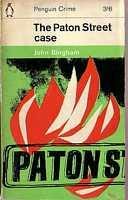Peace Like a River by Leif Enger
Review by Vicky T. (VickyJo)
Have you ever had this experience? Someone tells you about a book or a movie, and they praise it so highly, and tell you it’s the best thing they’ve ever seen or read…that they inspire you to read or watch it too…. and it turns out to be a huge disappointment? And it’s not so much that it’s a bad movie or book…it’s just that the person built up your expectations to such an incredible height that a letdown was probably inevitable.
I’m always mindful of this whenever I recommend books to people. I try not to make the book sound like the best thing ever written. I try to point out what I enjoyed about the book, and what I didn’t enjoy (if anything) and why I would encourage someone to read it. I don’t want to build up anyone’s expectations too high.
I’m relaying all this to you because I loved the book I’m recommending this week so much, I feel as though I should have a disclaimer! I’m afraid I’m going to rave, and gush over this author’s abilities and end up disappointing some readers who may not agree with me. But I can’t help it. This novel is amazing.
The title is “Peace Like a River,” and the author’s name is Leif Enger. It’s his first novel and an absolute gem. Enger writes beautifully…his prose is clear, understated, flowing. His characters are fully developed and endearing.
“Peace Like a River” takes place in Minnesota in the early 1960’s. The narrator is Reuben Land, an 11-year-old boy with severe asthma. Rube lives with his father, Jeremiah, a deeply spiritual man who truly seems to communicate with God; his older brother Davy, 16 and ready to be a man on his own, and his younger sister Swede, a budding writer at 9 years of age, who has a fondness for epic poems about the romantic Old West, and has read every Zane Grey novel in existence.
Mr. Land is the school custodian, and he has a run-in with two of the local “bad boys.” He feels the incident has been settled, but it escalates. The boys snatch Swede and then return her a few hours later, scared but unharmed. Davy isn’t content to leave justice in God’s hands, and when the two boys follow his lure and break into the Land’s home late one night, baseball bats in hand, Davy is ready. He guns down both boys and turns himself in to the sheriff.
On the morning of his sentencing, Davy breaks out of jail and disappears, a fugitive on the run. And when Rube’s father inherits a motor home shortly after, it seems as though the family is being urged to try and find Davy. And so begins their journey: all three of them eager to find Davy, but no one really talking about what they will do if and when they do find him. Rube, Swede and their father, Jeremiah, are all counting on a miracle, for miracles are something they are familiar with: As Rube says:
“Let me say something about that word: Miracle. For too long it’s been used to characterize things or events that, though pleasant, are entirely normal. Peeping chicks at Easter time, spring generally, a clear sunrise after an overcast week–a miracle, people say…I’m sorry, but nope. Such things are worth our notice every day of the week, but to call them miracles evaporates the strength of the word. Real miracles bother people…They rebut every rule all we good citizens take comfort in. Lazarus obeying orders and climbing up out of the grave–now there’s a miracle, and you can bet it upset a lot of folks who were standing around at the time. My sister, Swede, said something that rang in me like a bell: No miracle happens without a witness. The fact is, the miracles that sometimes flowed from my father’s fingertips had few witnesses but me. Is there a single person on whom I can press belief? No sir. All I can do is say, Here’s how it went. Here’s what I saw. Make of it what you will.” Reuben Land bears witness for us all in Leif Enger’s beautiful novel, Peace like a river.








